Wenhai 2 -- A Bad Day for Pigs
22 November 2005
Late fall is a bad time for pigs in the mountains of northwest Yunnan. Ever so slowly the rains stop, crops are harvested and leaves change color. Mountain villages grow sleepy as the growing season ends. Groups of Naxi or Yi people sit around tables in courtyards playing cards, sipping beer, laughing, talking, eating whatever is at hand...and butchering things. The faint sounds of goat and cow bells compete with the braying of donkeys, the shouts of kids chasing each other between mud brick houses and the thud of axes hitting meat and bone. It’s a nice time to be a human.
After surviving two weeks of midterm-exam-grading-hell, we escaped into the mountains for our second weekend at the Wenhai Ecolodge (see September 5, 2005 post to read about our first trip). The lodge is a convenient getaway for us “foreign teachers.” A short taxi ride to the trailhead and a 3 hour walk deliver you to the ephemeral Wenhai Lake, which occupies a broad basin in the foothills of Yulong Xueshan. Several small Naxi settlements populate the area around the lake and can be explored on short excursions. Or you can relax at the lodge where hot showers and cold beer are available and where a small deck affords views of the entire basin to the south and of the mountain to the north.
From Wenhai Lake, several Yi villages are accessible. The Yi people are less common than the Naxi in the area directly around Lijiang but are very prominent as one travels north through the mountains and into the Sichuan Province. They generally settle at higher elevations and wear more colorful clothing than the Naxi, whose muted blues and whites are common even in the big city of Lijiang. Over 5 million Yi live in China and they have had a fierce reputation even in recent history, raiding villages and taking slaves up until the 1950s. Relations are calm now and Naxi and Yi coexist peacefully in pastoral mountain valleys.
On our last Wenhai trip I stayed at the lake with Bei while Ellen and Tony hiked to a nearby Yi village. This time Ellen and Bei hiked near the lake and Jacqueline and I walked the two hours to the Yi village, a small and simple settlement in a valley that descends eventually (a 6 or more hour hike) to the Yangze, upstream from the Tiger Leaping Gorge.
This is where the pigs come in. Three things conspire against pigs in autumn: first, like many animals, pigs are made of meat; second, the amount of meat in each pig increases considerably during the summer months and plateaus in the fall, and third, the drop in air temperature is sufficient to preserve meat in the absence of refrigeration.
We entered the Yi village on a chilly Saturday afternoon and our attention was immediately drawn to two large pigs being aggressively butchered in a courtyard just below the main path through town (this activity was also happening in other houses and other villages throughout the area). Our interest was not unnoticed and we were invited by the Yi family to watch, which we did with some fascination as axes and knives made quick work of the two large animals which were laid out on tables in the courtyard.
A Yi woman with strong, ropey forearms and simple blue tattoos invited us into the kitchen where children deposited pig parts into basins beside the fire and an old musket hung on a sooty wall. We were asked to join the family for lunch, an invitation that we declined both because we didn’t want to eat their hard-earned food and because we were uncertain about exactly which pig parts we might be served.
The generosity of relatively poor mountain families and their open friendliness is both common and remarkable in China. Where in the wealthy U.S. would we invite strange passing foreigners into our kitchens for lunch? This is not to say that Americans are greedily hording their food, but that our culture just doesn’t work this way. China offers a refreshing glimpse of a different way to view community and humanity.
Below are a few photos from the weekend. Some are similar to our first trip, but many are different. The change in scene from the rainy season to the dry season is substantial, with lush greens and cloudy skies replaced by dry fields, sharp contrasts and snowy mountains.
Here's Bei on her trusty steed, ready to head up the trail to Wenhai. After riding through Tiger Leaping Gorge in October and now to Wenhai and back, Bei has become more than comfortable in the saddle. In fact, she can fall asleep there if you don't keep an eye on her.
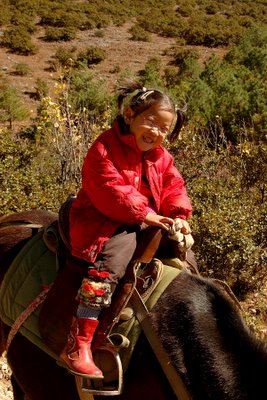
Yulong Xueshan from the Wenhai Ecolodge.

Another view of the Wenhai valley and the Snow Mountain. In the foreground, locals move cattle up the road towards the village.

Wenhai Lake is ephemeral. It grows during the rainy season and disappears in the dry season. Many channels and side streams like this one wander through the grasslands around the lake.
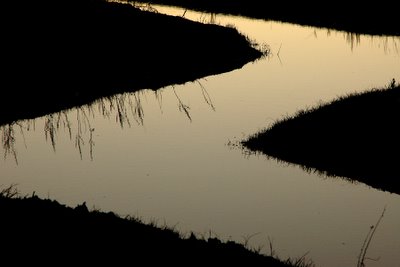
The Snow Mountain created strange clouds that we watched as we walked towards the Yi village. Eventually the clouds coalesced onto something more substantial, but precipitation is rare this time of year and we didn't experience any.
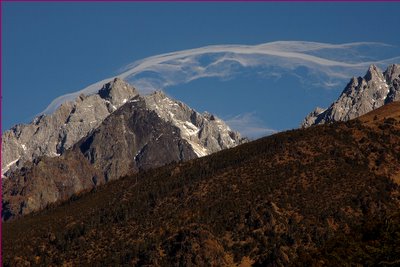
Another view of Yulong Xueshan from just behind the ecolodge.

Turnips are a major crop in this valley and every house was draped with them. We don't know if they are eaten by people or fed to livestock, but we were never served any. The quantity is impressive. Turnip pancakes? Turnip upside down cake? Turnip casserole?

More turnips. I'll have the pork and turnips. Without the turnips.
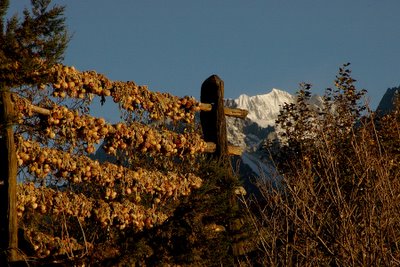
A closer view.

The fences in the Wenhai valley are beautiful and simple constructions of sticks and vines.

A detailed view of fence construction.

The kitchen at the ecolodge. We waited expectantly each morning for the fire to be built and the water to boil so that we could brew our Yunnan coffee, carried with us from town to supplement the tea that is offered everywhere. Coffee is not commonly drunk by the locals but of course is a requirement for our western metabolisms.

Smoke darkened light bulbs in the kitchen. Smoke from open fires finds its way out through vents in the ceiling after leaving a residue on windows and walls.

An old musket and powder holder in the Yi family's kitchen where we were invited to share the newly butchered pigs.

Yi men cheerfully working on one of two pigs that were slaughtered in their courtyard.
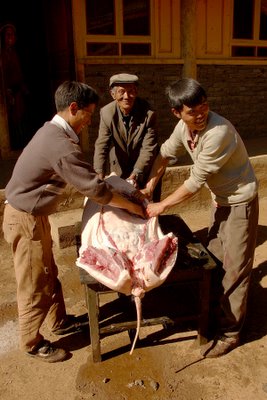
The pigs were butchered and cleaned by both men and women from the Yi family. Children carried various parts into the kitchen where they were deposited in basins or to a nearby spring where they were washed.

Yi women cleaning pig parts at the spring.

A wooden plow in the Yi village. These plows are common all over this part of China and are usually pulled by cows.

A collection of beer bottles stacked against a wall in the Yi village.

Another view from the Wenhai valley across fields now cleared of summer crops.

Leaves are changing slowly in the mountains, mostly to yellow. Many of the trees here are evergreens--long needled pines but there are also some oaks and some poplar species.

A senesced fern along the trail on our hike back down to the valley on Sunday afternoon.

Bei with her horse driver and Ellen during the walk down from Wenhai.

A view south towards the Lijiang valley as we hiked down into it at the end of the weekend.

Late fall is a bad time for pigs in the mountains of northwest Yunnan. Ever so slowly the rains stop, crops are harvested and leaves change color. Mountain villages grow sleepy as the growing season ends. Groups of Naxi or Yi people sit around tables in courtyards playing cards, sipping beer, laughing, talking, eating whatever is at hand...and butchering things. The faint sounds of goat and cow bells compete with the braying of donkeys, the shouts of kids chasing each other between mud brick houses and the thud of axes hitting meat and bone. It’s a nice time to be a human.
After surviving two weeks of midterm-exam-grading-hell, we escaped into the mountains for our second weekend at the Wenhai Ecolodge (see September 5, 2005 post to read about our first trip). The lodge is a convenient getaway for us “foreign teachers.” A short taxi ride to the trailhead and a 3 hour walk deliver you to the ephemeral Wenhai Lake, which occupies a broad basin in the foothills of Yulong Xueshan. Several small Naxi settlements populate the area around the lake and can be explored on short excursions. Or you can relax at the lodge where hot showers and cold beer are available and where a small deck affords views of the entire basin to the south and of the mountain to the north.
From Wenhai Lake, several Yi villages are accessible. The Yi people are less common than the Naxi in the area directly around Lijiang but are very prominent as one travels north through the mountains and into the Sichuan Province. They generally settle at higher elevations and wear more colorful clothing than the Naxi, whose muted blues and whites are common even in the big city of Lijiang. Over 5 million Yi live in China and they have had a fierce reputation even in recent history, raiding villages and taking slaves up until the 1950s. Relations are calm now and Naxi and Yi coexist peacefully in pastoral mountain valleys.
On our last Wenhai trip I stayed at the lake with Bei while Ellen and Tony hiked to a nearby Yi village. This time Ellen and Bei hiked near the lake and Jacqueline and I walked the two hours to the Yi village, a small and simple settlement in a valley that descends eventually (a 6 or more hour hike) to the Yangze, upstream from the Tiger Leaping Gorge.
This is where the pigs come in. Three things conspire against pigs in autumn: first, like many animals, pigs are made of meat; second, the amount of meat in each pig increases considerably during the summer months and plateaus in the fall, and third, the drop in air temperature is sufficient to preserve meat in the absence of refrigeration.
We entered the Yi village on a chilly Saturday afternoon and our attention was immediately drawn to two large pigs being aggressively butchered in a courtyard just below the main path through town (this activity was also happening in other houses and other villages throughout the area). Our interest was not unnoticed and we were invited by the Yi family to watch, which we did with some fascination as axes and knives made quick work of the two large animals which were laid out on tables in the courtyard.
A Yi woman with strong, ropey forearms and simple blue tattoos invited us into the kitchen where children deposited pig parts into basins beside the fire and an old musket hung on a sooty wall. We were asked to join the family for lunch, an invitation that we declined both because we didn’t want to eat their hard-earned food and because we were uncertain about exactly which pig parts we might be served.
The generosity of relatively poor mountain families and their open friendliness is both common and remarkable in China. Where in the wealthy U.S. would we invite strange passing foreigners into our kitchens for lunch? This is not to say that Americans are greedily hording their food, but that our culture just doesn’t work this way. China offers a refreshing glimpse of a different way to view community and humanity.
Below are a few photos from the weekend. Some are similar to our first trip, but many are different. The change in scene from the rainy season to the dry season is substantial, with lush greens and cloudy skies replaced by dry fields, sharp contrasts and snowy mountains.
Here's Bei on her trusty steed, ready to head up the trail to Wenhai. After riding through Tiger Leaping Gorge in October and now to Wenhai and back, Bei has become more than comfortable in the saddle. In fact, she can fall asleep there if you don't keep an eye on her.

Yulong Xueshan from the Wenhai Ecolodge.

Another view of the Wenhai valley and the Snow Mountain. In the foreground, locals move cattle up the road towards the village.

Wenhai Lake is ephemeral. It grows during the rainy season and disappears in the dry season. Many channels and side streams like this one wander through the grasslands around the lake.

The Snow Mountain created strange clouds that we watched as we walked towards the Yi village. Eventually the clouds coalesced onto something more substantial, but precipitation is rare this time of year and we didn't experience any.

Another view of Yulong Xueshan from just behind the ecolodge.

Turnips are a major crop in this valley and every house was draped with them. We don't know if they are eaten by people or fed to livestock, but we were never served any. The quantity is impressive. Turnip pancakes? Turnip upside down cake? Turnip casserole?

More turnips. I'll have the pork and turnips. Without the turnips.

A closer view.

The fences in the Wenhai valley are beautiful and simple constructions of sticks and vines.

A detailed view of fence construction.

The kitchen at the ecolodge. We waited expectantly each morning for the fire to be built and the water to boil so that we could brew our Yunnan coffee, carried with us from town to supplement the tea that is offered everywhere. Coffee is not commonly drunk by the locals but of course is a requirement for our western metabolisms.

Smoke darkened light bulbs in the kitchen. Smoke from open fires finds its way out through vents in the ceiling after leaving a residue on windows and walls.

An old musket and powder holder in the Yi family's kitchen where we were invited to share the newly butchered pigs.

Yi men cheerfully working on one of two pigs that were slaughtered in their courtyard.

The pigs were butchered and cleaned by both men and women from the Yi family. Children carried various parts into the kitchen where they were deposited in basins or to a nearby spring where they were washed.

Yi women cleaning pig parts at the spring.

A wooden plow in the Yi village. These plows are common all over this part of China and are usually pulled by cows.

A collection of beer bottles stacked against a wall in the Yi village.

Another view from the Wenhai valley across fields now cleared of summer crops.

Leaves are changing slowly in the mountains, mostly to yellow. Many of the trees here are evergreens--long needled pines but there are also some oaks and some poplar species.

A senesced fern along the trail on our hike back down to the valley on Sunday afternoon.

Bei with her horse driver and Ellen during the walk down from Wenhai.

A view south towards the Lijiang valley as we hiked down into it at the end of the weekend.


0 Comments:
Post a Comment
<< Home